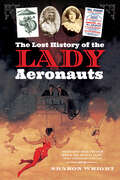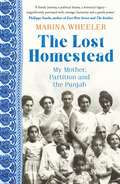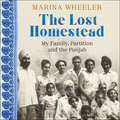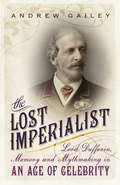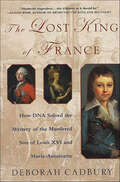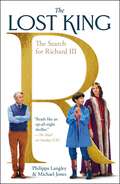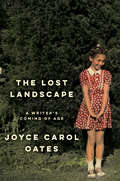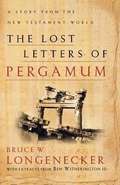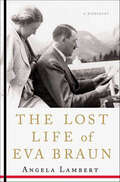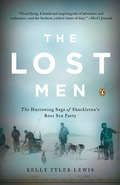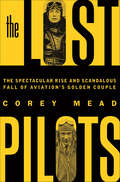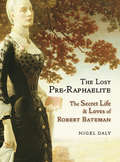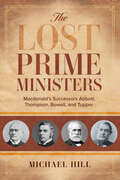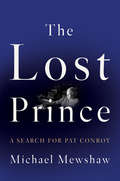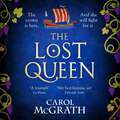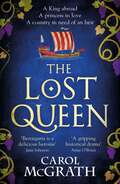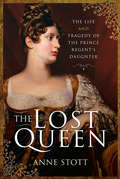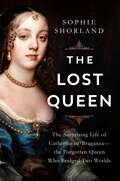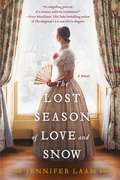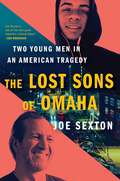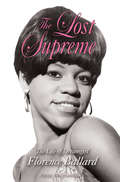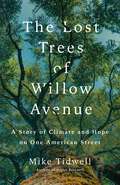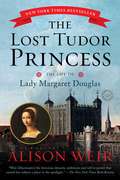- Table View
- List View
The Lost History of the Lady Aeronauts
by Sharon Wright&“A simply brilliant history that rescues from undeserved obscurity a roster of pioneering women in the very beginning of the age of aviation.&” —Midwest Book Review From have-a-go Georgians to emancipated Edwardians, the lady aeronauts were actresses, writers, heiresses, scientists, engineers, explorers, showgirls and suffragettes. These unsung trailblazers for female freedom enjoyed lives shot through with sheer courage and joie de vivre. Yet they were all but forgotten. Hold on tight for a white-knuckle balloon ride through their remarkable real-life stories . . . &“You couldn&’t want for a better antidote to pinkness than these tales of girls and women unleashing their pluck and inventiveness in the unregulated age of balloonomania . . . This is history at its most satisfying.&” —Damesnet &“Sharon Wright tells a fabulous tale, and has uncovered some terrific stories of long forgotten heroines of the air. Some stories are comic, many are tragic, many are a bit of both, and she tells it brilliantly.&” —Bristol Post &“History has never been so much fun!&” —What&’sHerName Podcast
The Lost Homestead: My Mother, Partition and the Punjab
by Marina WheelerSHORT LISTED FOR THE 2021 CHRISTOPHER BLAND PRIZE'The Lost Homestead is a memoir of Wheeler's mother and her family, which turns out to be so much more than that... it takes the reader into the contested history of India and Pakistan in the 1940s, and explores the impact of partition and division (from the Punjab to Berlin) on the lives of individuals.' - MARY BEARD'Deeply touching.' - Daily Mail'A personal, sometimes harrowing history of partition... a writer well worth reading.' - The Times'A deeply personal story of identity and a highly relatable journey for many in the diaspora... Wheeler taps a rich vein of personal history... Evocative... Gripping.' - Financial Times'A timely read given the current reassessment of colonialism . . . a charming memoir that weaves the story of India independence and the tragedy of the partition with that of her mother's own escape from an unhappy marriage.' - Christina Lamb, Sunday Times'A personal, sometimes harrowing history of partition . . . by narrating partition with a focus on her mother's family, the Singhs, she has made the abstractions of history suddenly more real: they are given names, faces and feelings . . . offers valuable insights, especially since Gandhi and Jinnah were also products of London's inns of court . . . [Marina Wheeler is] a writer well worth reading.' - Tanjil Rashid, The Times'A family journey, a political drama, a historical legacy - magnificently portrayed with courage, humanity and a gentle power.' - Philippe Sands, author of East West Street and The Ratline'A wonderful memoir, gripping, elegant, warm and insightful - a triumph. An intimate and inspiring portrayal of how a woman made her own world as nations and empire were made and unmade.' - Dr Shruti Kapila, Lecturer in Modern History, University of Cambridge'This book is more than a family memoir - it is an insightful glimpse into the way small worlds are forever changed by the impersonal currents of history.' Shashi Tharoor, author of Inglorious Empire: What the British Did to India***On 3 June 1947, as British India descended into chaos, its division into two states was announced. For months the violence and civil unrest escalated. With millions of others, Marina Wheeler's mother Dip Singh and her Sikh family were forced to flee their home in the Punjab, never to return. As an Anglo-Indian with roots in what is now Pakistan, Marina Wheeler weave's her mother's story of loss and new beginnings, personal and political freedom into the broader, still highly contested, history of the region. We follow Dip when she marries Marina's English father and leaves India for good, to Berlin, then a divided city, and to Washington DC where the fight for civil rights embraced the ideals of Mahatma Gandhi. The Lost Homestead touches on global themes that strongly resonate today: political change, religious extremism, migration, minorities, nationhood, identity and belonging. But above all it is about coming to terms with the past, and about the stories we choose to tell about ourselves.
The Lost Homestead: My Mother, Partition and the Punjab
by Marina WheelerOn 3 June 1947, as British India descended into chaos, its division into two states was announced. For months the violence and civil unrest escalated. With millions of others, Marina Wheeler's mother Dip Singh and her Sikh family were forced to flee their home in the Punjab, never to return. Through her mother's memories, accounts from her Indian family and her own research in both India and Pakistan, she explores how the peoples of these new nations struggled to recover and rebuild their lives. As an Anglo-Indian with roots in what is now Pakistan, Marina attempts to untangle some of these threads to make sense of her own mother's experience, while weaving her family's story into the broader, still highly contested, history of the region. This is a story of loss and new beginnings, personal and political freedom. It follows Dip when she marries Marina's English father and leaves India for good, to Berlin, then a divided city, and to Washington DC where the fight for civil rights embraced the ideals of Mahatma Gandhi. The Lost Homestead touches on global themes that strongly resonate today: political change, religious extremism, migration, minorities, nationhood, identity and belonging. But above all it is about coming to terms with the past, and about the stories we choose to tell about ourselves.(P) 2019 Hodder & Stoughton Ltd
The Lost Imperialist: Lord Dufferin, Memory and Mythmaking in an Age of Celebrity
by Andrew GaileyWinner of the Elizabeth Longford Prize for Historical Biography 2016Frederick Hamiton-Temple-Blackwood, 1st Marquess of Dufferin and Ava, enjoyed a glittering career which few could equal. As Viceroy of India and Governor-General of Canada, he held the two most exalted positions available under the Crown, but prior to this his achievements as a British ambassador included restoring order to sectarian conflict in Syria, helping to keep Canada British, paving the way for the annexation of Egypt and preventing war from breaking out on India's North-West Frontier.Dufferin was much more than a diplomat and politician, however: he was a leading Irish landlord, an adventurer and a travel writer whose Letters from High Latitudes proved a publishing sensation. He also became a celebrity of the time, and in his attempts to sustain his reputation he became trapped by his own inventions, thereafter living his public life in fear of exposure. Ingenuity, ability and charm usually saved the day, yet in the end catastrophe struck in the form of the greatest City scandal for forty years and the death of his heir in the Boer War.With unique access to the family archive at Clandeboye, Andrew Gailey presents a full biography of the figure once referred to as the 'most popular man in Europe'.
The Lost Imperialist: Lord Dufferin, Memory and Mythmaking in an Age of Celebrity
by Andrew GaileyWinner of the Elizabeth Longford Prize for Historical Biography 2016Frederick Hamiton-Temple-Blackwood, 1st Marquess of Dufferin and Ava, enjoyed a glittering career which few could equal. As Viceroy of India and Governor-General of Canada, he held the two most exalted positions available under the Crown, but prior to this his achievements as a British ambassador included restoring order to sectarian conflict in Syria, helping to keep Canada British, paving the way for the annexation of Egypt and preventing war from breaking out on India's North-West Frontier.Dufferin was much more than a diplomat and politician, however: he was a leading Irish landlord, an adventurer and a travel writer whose Letters from High Latitudes proved a publishing sensation. He also became a celebrity of the time, and in his attempts to sustain his reputation he became trapped by his own inventions, thereafter living his public life in fear of exposure. Ingenuity, ability and charm usually saved the day, yet in the end catastrophe struck in the form of the greatest City scandal for forty years and the death of his heir in the Boer War.With unique access to the family archive at Clandeboye, Andrew Gailey presents a full biography of the figure once referred to as the 'most popular man in Europe'.
The Lost King of France: How DNA Solved the Mystery of the Murdered Son of Louis XVI and Marie-Antoinette
by Deborah Cadbury“Cadbury lays out in fascinating detail the historical mystery of the royal heir . . . and uses modern science to try to solve it.” —The Wall Street JournalIn 1793, when Marie Antoinette was beheaded at the guillotine during the French Revolution, she left her adored eight-year-old son, Louis Charles, imprisoned in the Temple Tower. Far from inheriting a throne, the orphaned boy-king had to endure the hostility and abuse of a nation. Two years later, the revolutionary leaders declared Louis XVII dead. No grave was dug, no monument built to mark his passing.Immediately, rumors spread that the prince had, in fact, escaped from prison and was still alive. Others believed that he had been murdered, his heart cut out and preserved as a relic. As with the tragedies of England’s princes in the Tower and the Romanov archduchess Anastasia, countless “brothers” soon approached Louis-Charles’s older sister, Marie-Therese, who survived the revolution. They claimed not only the dauphin’s name, but also his inheritance. Several “princes” were plausible, but which, if any, was the real heir to the French throne?The Lost King of France is a moving and dramatic tale that interweaves a pivotal moment in France’s history with a compelling detective story that involves pretenders to the crown, royalist plots and palace intrigue, bizarre legal battles, and modern science. The quest for the truth continued into the twenty-first century, when, thanks to DNA testing, the strange odyssey of a stolen heart found within the royal tombs brought an exciting conclusion to the two-hundred-year-old mystery of the lost king of France.“A winning and highly readable account of the French Revolution.” —Publishers Weekly
The Lost King: The Search for Richard III
by Michael Jones Philippa LangleyThe official inside story of the discovery of the bones of Richard III now a major motion picture starring Sally Hawkins and Steve Coogan The mystery of who Richard III really was has fascinated historians, readers and audiences familiar with Shakespeare's dastardly portrait of a hunchbacked monster of royalty for centuries. In 2012, the remains of a man with a curving spine, who possibly was killed in battle, were discovered underneath the paving of a parking lot in Leicester, England. Phillipa Langley, head of The Richard III Society, spurred on by the work of the historian Michael Jones, led the team of who uncovered the remains, certain that she had found the bones of the monarch. When DNA verification later confirmed that the skeleton was, indeed, that of King Richard III, the discovery ranks among the great stories of passionate intuition and perseverance against the odds.The news of the discovery of Richard's remains has been widely reported by the British as well as worldwide and was front page news for both the New York Times and The Washington Post. Many believe that now, with King Richard III's skeleton in hand, historians will finally begin to understand what happened to him following the Battle of Bosworth Field (twenty miles or so from Leicester) and, ultimately, to know whether he was the hateful, unscrupulous monarch of Shakespeare's drama or a much more benevolent king interested in the common man. Written in alternating chapters, with Richard's 15th century life told by historian Michael Jones (author of the critically acclaimed Bosworth - 1485) contrasting with the 21st century eyewitness account of the search and discovery of the body by Philippa Langley, The Lost King will be both an extraordinary portrait of the last Plantagenet monarch and the inspiring story of the archaeological dig that finally brings the real King Richard III into the light of day.
The Lost Landscape
by Joyce Carol OatesA momentous memoir of childhood and adolescence from one of our finest and most beloved writers, as we've never seen her beforeIn The Lost Landscape, Joyce Carol Oates vividly re-creates the early years of her life in western New York State, powerfully evoking the romance of childhood and the way it colors everything that comes after. From early memories of her relatives to remembrances of a particularly poignant friendship with a red hen, from her first friendships to her first experiences with death, The Lost Landscape is an arresting account of the ways in which Oates's life (and her life as a writer) was shaped by early childhood and how her later work was influenced by a hardscrabble rural upbringing.In this exceptionally candid, moving, and richly reflective recounting of her early years, Oates explores the world through the eyes of her younger self and reveals her nascent experiences of wanting to tell stories about the world and the people she meets. If Alice in Wonderland was the book that changed a young Joyce forever and inspired her to look at life as offering end-less adventures, she describes just as unforgettably the harsh lessons of growing up on a farm. With searing detail and an acutely perceptive eye, Oates renders her memories and emotions with exquisite precision to truly transport the reader to a bygone place and time, to the lost landscape of the writer's past but also to the lost landscapes of our own earliest, and most essential, lives.
The Lost Letters of Pergamum: A Story from the New Testament World
by Ben Witherington Bruce W. Longenecker"The Lost Letters of Pergamum" introduces readers to the style of New Testament writings and the social and political world of Jesus and his first followers. Using the literary technique of correspondence through ancient letters, Longenecker mixes fact and fiction to paint an interesting and informative picture of the New Testament world and early Christianity.
The Lost Life of Eva Braun: A Biography
by Angela LambertEva Braun is one of history's most famous nonentities. She has been dismissed as a racist, feathered-headed shop girl, yet sixty-two years after her death her name is still instantly recognizable. She left her convent school at the age of seventeen and met Hitler a few months later. She became his mistress before she was twenty. How did unsophisticated little Fraulein Braun, twenty-three years his junior, hold the most powerful man in Europe in an exclusive sexual relationship that lasted from 1932 until their joint suicide? Were they really lovers, and what were the background influences and psychological tensions of the middle-class Catholic girl from Munich who shared his intimate life? How can her ordinariness and apparent decency be reconciled with an unshakeable loyalty to the monster she loved? She left almost no personal material or documents but her private diary and photograph albums show that her life with Hitler, far from being a luxurious sinecure, caused her emotional torture. His chauffeur called her "the unhappiest woman in Germany." The Führer humiliated her in public while the top Nazis' wives, living in his privileged enclave on a Bavarian mountainside, despised her. Yet Albert Speer said: "She has been much maligned. She was very shy, modest. A man's woman: gay, gentle, and kind; incredibly undemanding . . . a restful sort of girl. And her love for Hitler---as she proved in the end---was beyond question." Eva loved the Führer, not for his power, nor because, thanks to him, she lived in luxury. His material gifts were nothing compared with the one thing she really wanted: his child. She remained invisible and unknown, a nonperson. They were never seen in public together and she never saw him alone except in the bedroom, yet their long relationship was a sort of marriage. Angela Lambert reveals a woman the world never knew until the last twenty-four hours of her life. In the small hours of April 29, 1945, as Allied troops raced to capture Berlin and the bunker below the Reichskanzlei where the defeated Nazi leaders were hiding, Eva Braun finally achieved her life's ambition by becoming Hitler's wife. Next day they both swallowed cyanide and died instantly. She was young, healthy, and thirty-three years old. Based on detailed new research, this is an authoritative biography, only the second life of Eva written in English.
The Lost Men
by Kelly Tyler-LewisIn 1914, Sir Ernest Shackleton sailed south aboard the Endurance to be the first to cross Antarctica. Shackleton's endeavor is legend, but few know the astonishing story of the Ross Sea party, the support crew he dispatched to the opposite side of the continent to build a vital lifeline of food and fuel depots. When the Ross Sea ship, the Aurora, broke free of her moorings and disappeared in a gale in 1915, she left ten men stranded on the continent with only the clothes on their backs and little hope of rescue. Against all odds, the men decided to go forward with their mission, sledging 1,700 miles in a record-setting two-year odyssey. They never imagined that their immense sacrifice was futile -- for Shackleton never set foot on the continent, and the Endurance lay crushed at the bottom of the Weddell Sea. Inexperienced and poorly equipped, the men of the Ross Sea party endured the unspeakable suffering of malnutrition, hypothermia, and extreme weather conditions with fortitude. With their personal journals and previously unpublished documents, Kelly Tyler-Lewis brings us close to these men in their best and bleakest times and revives for us their heroic, astounding story of survival in the most hostile environment on earth.
The Lost Pilots: The Spectacular Rise and Scandalous Fall of Aviation's Golden Couple
by Corey MeadCorey Mead's The Lost Pilots is the saga of two star crossed pilots who soar to the greatest heights of fame, tailspin into scandal and crime, and go the ultimate lengths for a chance at redemption...During the height of the roaring twenties, Jessie Miller longs for adventure. Fleeing a passionless marriage in the backwaters of Australia, twenty-three-year-old Jessie arrives in London and promptly falls in with the Bright Young Things, those gin-soaked boho-chic intellectuals draped in suits, flapper dresses, and pearls. At a party Jessie meets Captain William Lancaster, married himself and fresh from the Royal Air Force, with a scheme in his head to become as famous as Charles Lindbergh, who has just crossed the Atlantic. Lancaster will do Lindy one better: fly from London to Melbourne, and in Jessie Miller he’s found the perfect co-pilot.Within months the two embark on a half-year journey across the globe, hopping from one colonial outpost to the next. But like world records, marriage vows can be broken, and upon their landing in Melbourne Jessie and William are not only international celebrities, but also deeply inlove.Yet the crash of 1929 catches up to even the fastest aviator, and the couple finds themselves in dire straits at their rented house on the outskirts of Miami – the bright glare of the limelight fading quickly.To make ends meet Jessie agrees to write a memoir, and picks the dashing Haden Clarke to be her ghostwriter. It’s not long before this toxic mix of bootleg booze and a handsome interloper leads to a shocking crime, a trial that rivets and scandalizes the world, and a reckless act of abandon to win back former glory.The Lost Pilots is an extraordinary true story, brought to vivid life by Corey Mead. Based on years of research, and full of adventure, forbidden passion, crime, scandal and tragedy, it is a masterwork of narrative nonfiction that firmly restores one of aviation’s leading female pioneers to her rightful place in history.
The Lost Pre-Raphaelite
by Nigel DalyWhen the author bought a falling down fortified house on the Staffordshire moorlands, he had no reason to anticipate the astonishing tale that would unfold as it was restored. A mysterious set of relationships emerged amongst its former owners, revolving round the almost forgotten artist, Robert Bateman, a prominent Pre-Raphaelite and friend of Burne Jones. He was to marry the granddaughter of the Earl of Carlisle, and to be associated with Benjamin Disraeli, William Gladstone, and other prominent political and artistic figures.But he had abandoned his life as an artist in mid-career to live as a recluse, and his rich and glamorous wife-to-be had married the local vicar, already in his sixties and shortly to die. The discovery of two clearly autobiographical paintings led to an utterly absorbing forensic investigation into Bateman's life.The story moves from Staffordshire to Lahore, to Canada, Wyoming, and then, via Buffalo Bill, to Peru and back to England. It leads to the improbable respectability of Imperial Tobacco in Bristol, and then, less respectably, to a car park in Stoke-on-Trent. En route the author pieces together an astonishing and deeply moving story of love and loss, of art and politics, of morality and hypocrisy, of family secrets concealed but never quite completely obscured. The result is a page-turning combination of detective story and tale of human frailty, endeavor, and love. It is also a portrait of a significant artist, a reassessment of whose work is long overdue.Nigel Daly is an antique dealer and house restorer.
The Lost Prime Ministers: Macdonald's Successors Abbott, Thompson, Bowell, and Tupper
by Michael HillAfter John A. Macdonald’s death, four Tory prime ministers — each remarkable but all little known — rose to power and fell in just five years. From 1891 to 1896, between John A. Macdonald’s and Wilfrid Laurier’s tenures, four lesser-known men took on the mantle of leadership. Tory prime ministers John Abbott, John Thompson, Mackenzie Bowell, and Charles Tupper headed the government of Canada in rapid succession. Each came to the job with qualifications and limitations, and each left after unexpectedly short terms. Yet these reluctant prime ministers are an important part of our political legacy. Their roles were much more than caretakers between the administrations of two great leaders. Personal tragedy, terrible health issues, backstabbing, and political manipulation all led to their eventual downfalls. The Lost Prime Ministers is the dramatic saga of these overlooked Canadian leaders.
The Lost Prince: A Search for Pat Conroy
by Michael Mewshaw&“In The Lost Prince Michael Mewshaw sets down one of the most gripping stories of friendship I&’ve ever read.&” —Daniel Menaker, author of My Mistake: A MemoirPat Conroy was America&’s poet laureate of family dysfunction. A larger–than–life character and the author of such classics as The Prince of Tides and The Great Santini, Conroy was remembered by everybody for his energy, his exuberance, and his self–lacerating humor.Michael Mewshaw&’s The Lost Prince is an intimate memoir of his friendship with Pat Conroy, one that involves their families and those days in Rome when they were both young—when Conroy went from being a popular regional writer to an international bestseller. Family snapshots beautifully illustrate that time. Shortly before his forty–ninth birthday, Conroy telephoned Mewshaw to ask a terrible favor. With great reluctance, Mewshaw did as he was asked—and never saw Pat Conroy again.Although they never managed to reconcile their differences completely, Conroy later urged Mewshaw to write about &“me and you and what happened . . . i know it would cause much pain to both of us. but here is what that story has that none of your others have.&” The Lost Prince is Mewshaw&’s fulfillment of a promise.
The Lost Queen
by Carol McGrath'Well researched, elegantly written, with a deft touch for both romance and historical detail. The Lost Queen is a gripping historical drama to be savoured' ANNE O'BRIEN'An excellent read, meticulously researched, beautifully told. Berengaria is a delicious heroine, thoroughly engaging, a refreshingly unusual viewpoint for this epic tale' JANE JOHNSON1191 and the Third Crusade is underway . . .It is 1191 and King Richard the Lionheart is on crusade to pitch battle against Saladin and liberate the city of Jerusalem and her lands. His mother, the formidable Eleanor of Aquitaine and his promised bride, Princess Berengaria of Navarre, make a perilous journey over the Alps in midwinter. They are to rendezvous with Richard in the Sicilian port of Messina. There are hazards along the way - vicious assassins, marauding pirates, violent storms and a shipwreck. Berengaria is as feisty as her foes and, surviving it all, she and Richard marry in Cyprus and continue to the Holy Land. England needs an heir. But first, Richard and his Queen must return home . . . The Lost Queen is a thrilling medieval story of high adventure, survival, friendship and the enduring love of a Queen for her King.Acclaim for Carol McGrath's ROSE trilogy:'Powerful, gripping and beautifully told' KATE FURNIVALL on The Silken Rose'A tour de force of gripping writing, rich historical detail and complex, fascinating characters' NICOLA CORNICK on The Stone Rose'A beautifully narrated novel' K J MAITLAND on The Damask RoseWhat readers love about Carol McGrath's novels:'Brilliant historical fiction brought to life''Brilliant. You feel you are lost in a bygone time''Wonderfully enjoyable''Page-turning and gripping''A feast for the senses'
The Lost Queen
by Carol McGrath'Well researched, elegantly written, with a deft touch for both romance and historical detail. The Lost Queen is a gripping historical drama to be savoured' ANNE O'BRIEN'An excellent read, meticulously researched, beautifully told. Berengaria is a delicious heroine, thoroughly engaging, a refreshingly unusual viewpoint for this epic tale' JANE JOHNSON1191 and the Third Crusade is underway . . .It is 1191 and King Richard the Lionheart is on crusade to pitch battle against Saladin and liberate the city of Jerusalem and her lands. His mother, the formidable Eleanor of Aquitaine and his promised bride, Princess Berengaria of Navarre, make a perilous journey over the Alps in midwinter. They are to rendezvous with Richard in the Sicilian port of Messina. There are hazards along the way - vicious assassins, marauding pirates, violent storms and a shipwreck. Berengaria is as feisty as her foes and, surviving it all, she and Richard marry in Cyprus and continue to the Holy Land. England needs an heir. But first, Richard and his Queen must return home . . . The Lost Queen is a thrilling medieval story of high adventure, survival, friendship and the enduring love of a Queen for her King.Acclaim for Carol McGrath's ROSE trilogy:'Powerful, gripping and beautifully told' KATE FURNIVALL on The Silken Rose'A tour de force of gripping writing, rich historical detail and complex, fascinating characters' NICOLA CORNICK on The Stone Rose'A beautifully narrated novel' K J MAITLAND on The Damask RoseWhat readers love about Carol McGrath's novels:'Brilliant historical fiction brought to life' ⭐ ⭐ ⭐ ⭐ ⭐'Brilliant. You feel you are lost in a bygone time' ⭐ ⭐ ⭐ ⭐ ⭐'Wonderfully enjoyable' ⭐ ⭐ ⭐ ⭐ ⭐'Page-turning and gripping' ⭐ ⭐ ⭐ ⭐ ⭐'A feast for the senses' ⭐ ⭐ ⭐ ⭐ ⭐
The Lost Queen
by Carol McGrath'Well researched, elegantly written, with a deft touch for both romance and historical detail. The Lost Queen is a gripping historical drama to be savoured' ANNE O'BRIEN'An excellent read, meticulously researched, beautifully told. Berengaria is a delicious heroine, thoroughly engaging, a refreshingly unusual viewpoint for this epic tale' JANE JOHNSON1191 and the Third Crusade is underway . . .It is 1191 and King Richard the Lionheart is on crusade to pitch battle against Saladin and liberate the city of Jerusalem and her lands. His mother, the formidable Eleanor of Aquitaine and his promised bride, Princess Berengaria of Navarre, make a perilous journey over the Alps in midwinter. They are to rendezvous with Richard in the Sicilian port of Messina. There are hazards along the way - vicious assassins, marauding pirates, violent storms and a shipwreck. Berengaria is as feisty as her foes and, surviving it all, she and Richard marry in Cyprus and continue to the Holy Land. England needs an heir. But first, Richard and his Queen must return home . . . The Lost Queen is a thrilling medieval story of high adventure, survival, friendship and the enduring love of a Queen for her King.Acclaim for Carol McGrath's ROSE trilogy:'Powerful, gripping and beautifully told' KATE FURNIVALL on The Silken Rose'A tour de force of gripping writing, rich historical detail and complex, fascinating characters' NICOLA CORNICK on The Stone Rose'A beautifully narrated novel' K J MAITLAND on The Damask RoseWhat readers love about Carol McGrath's novels:'Brilliant historical fiction brought to life' ⭐ ⭐ ⭐ ⭐ ⭐'Brilliant. You feel you are lost in a bygone time' ⭐ ⭐ ⭐ ⭐ ⭐'Wonderfully enjoyable' ⭐ ⭐ ⭐ ⭐ ⭐'Page-turning and gripping' ⭐ ⭐ ⭐ ⭐ ⭐'A feast for the senses' ⭐ ⭐ ⭐ ⭐ ⭐
The Lost Queen: The Life and Tragedy of the Prince Regent's Daughter
by Anne M. StottA look at the tragically short life of the only daughter of Britain’s King George IV who won the heart of a nation.As the only child of the Prince Regent and Caroline of Brunswick, Princess Charlotte of Wales (1796-1817) was the heiress presumptive to the throne. Her parents’ marriage had already broken up by the time she was born. She had a difficult childhood and a turbulent adolescence, but she was popular with the public, who looked to her to restore the good name of the monarchy. When she broke off her engagement to a Dutch prince, her father put her under virtual imprisonment, and she endured a period of profound unhappiness. But she held out for the freedom to choose her husband, and when she married Prince Leopold of Saxe-Coburg, she finally achieved contentment. Her happiness was cruelly cut short when she died in childbirth at the age of twenty-one, only eighteen months later. A shocked nation went into mourning for its “people’s princess,” the queen who never was.“This perspicacious study of Charlotte’s short life is superb. Anne Stott is an accomplished and highly readable biographer whose earlier subjects have included William Wilberforce and Hannah More. She wears her research lightly—which is not to say that the book is anything less than scholastic (quite the opposite). Highly recommended.” —Naomi Clifford, author of The Murder of Mary Ashford
The Lost Queen: The Surprising Life of Catherine of Braganza—the Forgotten Queen Who Bridged Two Worlds
by Sophie ShorlandAn enthralling and vivid portrait of Queen Catherine of Braganza, wife of Charles II, that reveals her forgotten place in history.A long-overlooked figure in history, Catherine has a crucial place in the history of the British Empire: she may have failed to produce an heir to the throne, but her marriage to Charles in 1662 marked a key turning point in Britain&’s imperial ascendancy, for part of her dowry was Bombay, Britain&’s first territory of the Indian subcontinent. Catherine also was highly influential in the worlds of fashion, Baroque art and music, and food and culture. She popularized tea drinking, bringing England&’s national drink into fashion for the first time. Her life was at the nexus of Old and New worlds, war and exploration, frivolity and scientific enquiry. Noteworthy in its scope and approach to sources, The Lost Queen combines personal and political accounts, offering a lively portrait of Catherine&’s life, and the wider politics and explorations of her time.
The Lost Season of Love and Snow: A Novel
by Jennifer Laam"A captivating tale in which Natalya Pushkin is vividly imagined. [A] sensitive and skillfully written novel... sure to enchant." - Hazel Gaynor, New York Times bestselling author of The Girl Who Came HomeThe unforgettable story of Alexander Pushkin’s beautiful wife, Natalya, a woman much admired at Court, and how she became reviled as the villain of St. Petersburg.At the beguiling age of sixteen, Natalya Goncharova is stunningly beautiful and intellectually curious. At her first public ball during the Christmas of 1828, she attracts the romantic attention of Russia’s most lauded rebel poet: Alexander Pushkin. Finding herself deeply attracted to Alexander’s intensity and joie de vivre, Natalya is swept up in a courtship and then a marriage full of passion but also destructive jealousies. When vicious court gossip leads Alexander to defend his honor as well as Natalya’s in a duel, he tragically succumbs to his injuries. Natalya finds herself reviled for her perceived role in his death. In her striking new novel, The Lost Season of Love and Snow, Jennifer Laam helps bring Natalya’s side of the story to life with vivid imagination—the compelling tale of her inner struggle to create a fulfilling life despite the dangerous intrigues of a glamorous imperial Court and that of her greatest love.
The Lost Sons of Omaha: Two Young Men in an American Tragedy
by Joe SextonFrom the award–winning journalist Bob Woodward calls "one of the truly great reporters working today," a searing, no-holds-barred account of two linked and tragic deaths stemming from the 2020 George Floyd protests that explores the complex political and racial mistrust and division of today&’s America.&“A monumental study of violence and grief...one of the most superb testaments about the confusion, despair, and—hopefully—humility that frames our century that one could ever hope to read." —Hilton AlsOn May 30, 2020, in Omaha, Nebraska, amid the protests that rocked our nation after George Floyd&’s death at the hands of police, thirty-eight-year-old white bar owner and Marine veteran Jake Gardner fatally shot James Scurlock, a twenty-two-year-old Black protestor and young father. What followed were two investigations of Scurlock&’s death, one conducted by the white district attorney Don Kleine, who concluded that Gardner had legally acted in self-defense and released him without a trial, and a second grand jury inquiry conducted by African American special prosecutor Fred Franklin that indicted Gardner for manslaughter and demanded he face trial. Days after the indictment, Gardner killed himself with a single bullet to the head. The deaths of both Scurlock and Gardner gave rise to a toxic brew of misinformation, false claims, and competing political agendas. The two men, each with their own complicated backgrounds, were turned into grotesque caricatures. The twin tragedies amounted to an ugly and heartbreaking reflection of a painfully divided country. Here, Joe Sexton masterfully unpacks the whole twisting, nearly unbelievable chronicle into a meticulously reported and nuanced account of the two deaths, explaining which claims were true and which distorted or simply false. The Lost Sons of Omaha involves some of the most pressing issues facing America today, including our country&’s dire need for gun control and mental health reform; the dangerous spread of fake news, particularly on social media; and the urgent call to band together in the collective pursuit of truth, fairness, and healing. &“A bracing, rigorously reported story—told with grace and nuance—that takes readers deep into the fault lines of today&’s America.&” —Andrea Elliott, Pulitzer Prize-winning author of Invisible Child
The Lost Supreme: The Life of Dreamgirl Florence Ballard
by Peter BenjaminsonIn the months before she died, Florence Ballard, the spunky teenager who founded the most successful female vocal group in history--the Supremes--told her own side of the story. Recorded on tape, Flo shed light on all areas of her life, including the surprising identity of the man by whom she was raped prior to her entering the music business, the details of her love-hate relationship with Motown Records czar Berry Gordy, her drinking problem and pleas for help, a never-ending desire to be the Supremes' lead singer, and her attempts to get her life back on track after being brutally expelled from the group. This is a tumultuous and heartbreaking story of a world-famous performer whose life ended at the age of 32 as a lonely mother of three who had only recently recovered from years of poverty and despair.
The Lost Trees of Willow Avenue: A Story of Climate and Hope on One American Street
by Mike TidwellA riveting and elegant story of climate change on one city street, full of surprises and true stories of human struggle and dying local trees – all against the national backdrop of 2023's record heat domes and raging wildfires and, simultaneously, rising hopes for clean energy.In 2023, author and activist Mike Tidwell decided to keep a record for a full year of the growing impacts of climate change on his one urban block right on the border with Washington, DC. A love letter to the magnificent oaks and other trees dying from record heat waves and bizarre rain, Tidwell's story depicts the neighborhood's battle to save the trees and combat climate change: The midwife who builds a geothermal energy system on the block, the Congressman who battles cancer and climate change at the same time, and the Chinese-American climate scientist who wants to bury billions of the world's dying trees to store their carbon and help stabilize the atmosphere.The story goes beyond ailing trees as Tidwell chronicles people on his block coping with Lyme disease, a church with solar panels on its roof and floodwater in its basement, and young people anguishing over whether to have kids –all in the same neighborhood and all against the backdrop of 2023’s record global temperatures and raging wildfires and hurricanes. Then there’s Tidwell himself who explores the ethical and scientific questions surrounding the idea of “geoengineering” as a last-ditch way to save the world’s trees – and human communities everywhere – by reflecting sunlight away from the planet. No book has told the story of climate change this way: hyper-local, full of surprises, full of true stories of life and death in one neighborhood. The Lost Trees of Willow Avenue is a harrowing and hopeful proxy for every street in America and every place on Earth.
The Lost Tudor Princess: The Life of Lady Margaret Douglas
by Alison WeirFrom New York Times bestselling author and acclaimed historian Alison Weir comes the first biography of Margaret Douglas, the beautiful, cunning niece of Henry VIII of England who used her sharp intelligence and covert power to influence the succession after the death of Elizabeth I. Royal Tudor blood ran in her veins. Her mother was a queen, her father an earl, and she herself was the granddaughter, niece, cousin, and grandmother of monarchs. Lady Margaret Douglas, Countess of Lennox, was an important figure in Tudor England, yet today, while her contemporaries--Anne Boleyn, Mary, Queen of Scots, Elizabeth I--have achieved celebrity status, she is largely forgotten. <P>Margaret's life was steeped in intrigue, drama, and tragedy--from her auspicious birth in 1530 to her parents' bitter divorce, from her ill-fated love affairs to her appointment as lady-in-waiting for four of Henry's six wives. In an age when women were expected to stay out of the political arena, alluring and tempestuous Margaret helped orchestrate one of the most notorious marriages of the sixteenth century: that of her son Lord Darnley to Mary, Queen of Scots. Margaret defiantly warred with two queens--Mary, and Elizabeth of England--and was instrumental in securing the Stuart ascension to the throne of England for her grandson, James VI. The life of Margaret Douglas spans five reigns and provides many missing links between the Tudor and Stuart dynasties. Drawing on decades of research and myriad original sources--including many of Margaret's surviving letters--Alison Weir brings this captivating character out of the shadows and presents a strong, capable woman who operated effectively and fearlessly at the very highest levels of power. <br> <b> NAMED ONE OF THE BEST BOOKS OF THE YEAR BY THE INDEPENDENT </b>
